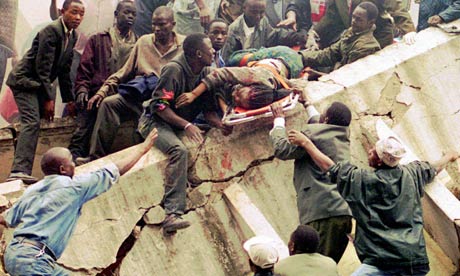Normally, I try to post once a day, and I’ll admit that it is sometimes a challenge to come up with something that is not a total waste of time.
Today, I had the opposite problem. I had saved this to publish this morning, then found something else I wanted to use. Both were topical – each would lose some value if held another day – so today, you get two for the price of one - BC
In an editorial yesterday, The New York Times said:
Civil Justice, Military Injustice
Supporters of the tribunals at Guantánamo Bay, Cuba, who insist military justice, not the federal courts, is the best way to deal with terrorists, should pay close attention to Tuesday’s events in a United States District Court in Manhattan. Faisal Shahzad was sentenced to life imprisonment, five months and four days after he tried to blow up his car in Times Square.
When Mr. Shahzad was arrested, and later given a Miranda warning, the “tough on terrorists” crowd screamed about coddling and endangering the country’s security. They didn’t stop complaining, even after Mr. Shahzad cooperated with investigators and entered a guilty plea with a mandatory life sentence. All of this happened without the Federal Bureau of Investigation and the New York Police Department breaking laws or violating Constitutional protections.
……..
But, the imaginary ink was barely dry on the Virtual Opinion Page when another story made the news:
First civilian trial of a Guantánamo Bay detainee halted
Associated Press - Wednesday 6 October 2010 18.55 BST
 Photograph: Khalil Senosi/AP
Photograph: Khalil Senosi/AP
The first civilian trial of a Guantánamo Bay detainee was delayed today after a Manhattan judge told prosecutors they could not call their star witness.
Judge Lewis Kaplan blocked the government in Washington from calling a man whom authorities said sold explosives to Ahmed Khalfan Ghailani, the defendant. Defense lawyers say investigators learned about the witness only after Ghailani underwent harsh interrogation at a secret CIA camp between 2004 and 2006.
"The court has not reached this conclusion lightly," Kaplan wrote. "It is acutely aware of the perilous nature of the world in which we live. But the constitution is the rock upon which our nation rests. We must follow it, not when it is convenient, but when fear and danger beckon in a different direction."
Washington immediately asked for a delay of the trial, which had been expected to begin with opening statements today, so that it had time to appeal against the ruling should it decide to do so.
Ghailani is charged with conspiring in the 1998 bombings of two US embassies in Africa: Dar es Salaam in Tanzania and Nairobi in Kenya. The attacks killed 224 people, including a dozen Americans. He was smiling and talking to his lawyers at the defense table after the judge ruled.
The judge issued his written three-page ruling after a hearing three weeks ago in which Hussein Abebe, the star witness in question, testified about his dealings with authorities.
The defense had asked the judge to exclude Abebe's testimony on the grounds that it would be the product of statements made by Ghailani to the CIA under duress.
On that point, Kaplan said, "Abebe was identified and located as a close and direct result of statements made by Ghailani while he was held by the CIA. The government has elected not to litigate the details of Ghailani's treatment while in CIA custody. It has sought to make this unnecessary by asking the court to assume in deciding this motion that everything Ghailani said while in CIA custody was coerced."
The judge noted that he had previously rejected defense motions to dismiss the indictment on the grounds that Ghailani was deprived of a speedy trial and that his treatment by the CIA was so outrageous as to require termination of the charges.
------
I’ll freely admit to having mixed emotions about this.
On the one hand, if we have irrefutable evidence of Ghailani’s guilt, I think we should be able to use it, regardless of how it was obtained. On the other hand, the Constitution has gone flying out the window before in times of war, and it always seems to diminish us in the long run, always seems wrong in retrospect.
Just ask any Japanese-American who was born, like my friend John, in an internment camp.
No comments:
Post a Comment